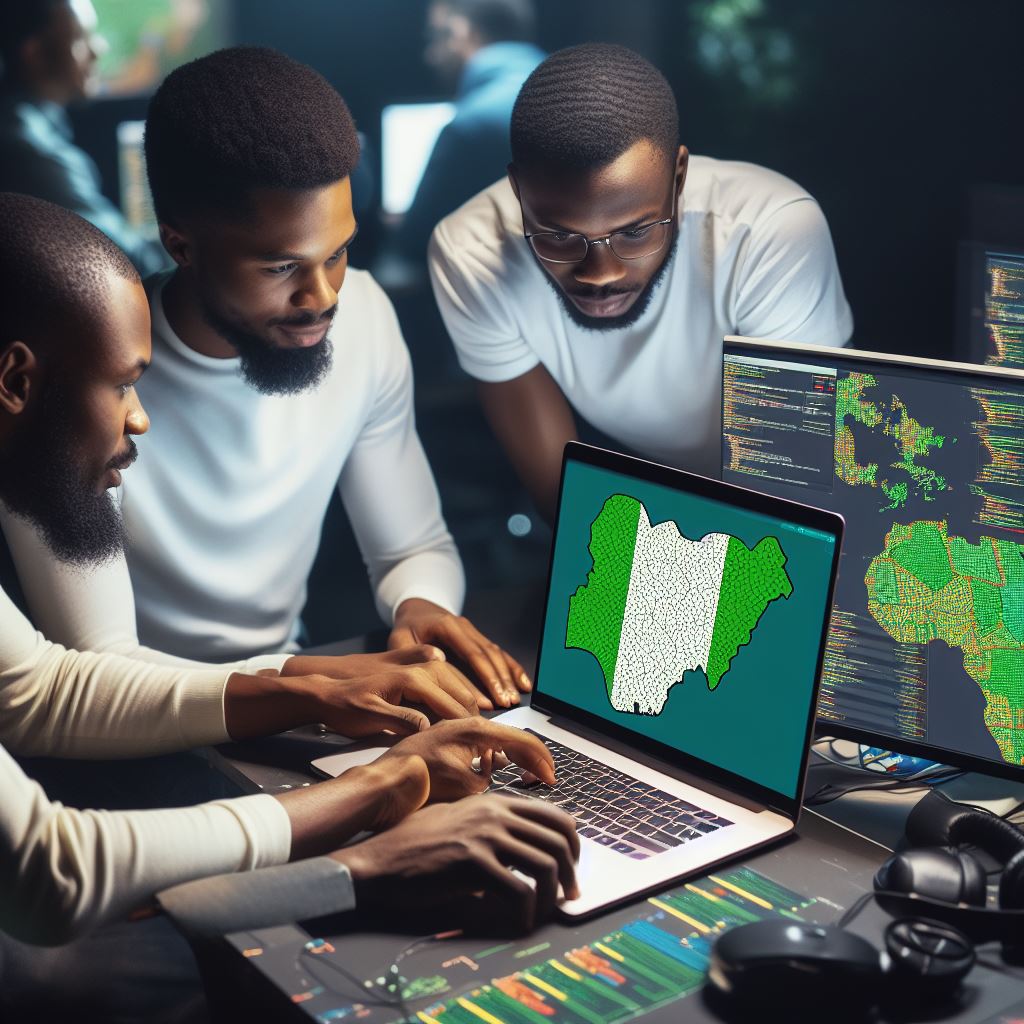Introduction
Nigeria Coding Academy, one of the leading institutions in the country, has been instrumental in equipping individuals with coding skills.
With a focus on solving local problems, coding projects have become essential for meaningful development within Nigerian communities.
Solving local problems through coding projects is of utmost importance. Not only does it address specific needs in the society, but it also empowers individuals by providing innovative solutions.
By harnessing the power of technology, these projects contribute to the overall growth and advancement of Nigeria.
The aim of this blog post is to shed light on how coding projects can make a tangible difference in Nigeria.
By showcasing real-life examples, we hope to inspire more individuals to take up coding and use their skills to tackle local challenges.
Additionally, this article aims to encourage collaboration among coders, organizations, and communities to create sustainable solutions and accelerate progress.
In the upcoming sections, we will delve deeper into the impact of coding projects in Nigeria.
We will explore success stories, discuss the benefits, and highlight the potential for future growth.
By the end, readers will have a comprehensive understanding of why coding projects matter and how they can actively contribute to solving local problems in Nigeria.
Key Local Problems Faced in Nigeria
A. Lack of access to quality education
In Nigeria, one of the major local problems is the lack of access to quality education.
Many children and young adults are unable to attend school or receive a proper education.
This lack of educational opportunity hinders their ability to improve their lives and contribute to society.
Without quality education, the cycle of poverty and inequality continues to perpetuate in Nigeria.
B. Unemployment and underemployment
Another key local problem in Nigeria is high rates of unemployment and underemployment.
There is a shortage of job opportunities that match the skills and qualifications of the Nigerian workforce.
As a result, many individuals are forced to settle for low-paying jobs that do not fully utilize their capabilities.
This not only leads to economic instability but also affects the overall well-being and quality of life for Nigerians.
C. Inefficient healthcare system
The healthcare system in Nigeria is plagued by inefficiencies and inadequate resources.
There is a lack of access to quality healthcare services, particularly in rural areas.
Medical facilities often suffer from outdated infrastructure, insufficient medical staff, and a lack of essential supplies.
Unlock Your Unique Tech Path
Get expert tech consulting tailored just for you. Receive personalized advice and solutions within 1-3 business days.
Get StartedThis results in compromised healthcare outcomes and prevents individuals from receiving the treatment they need.
D. Inadequate infrastructure
Nigeria faces significant challenges in terms of inadequate infrastructure.
Basic amenities such as water and electricity are not consistently available in many areas.
Transportation networks are poorly developed, making it difficult for people to commute and for goods to be transported efficiently.
This lack of infrastructure hampers economic growth and impedes the overall development of the country.
E. Corruption and transparency issues
Corruption and transparency issues are pervasive problems in Nigeria.
It undermines the effective functioning of public institutions and erodes public trust.
Transparency and accountability are lacking in the government, leading to mismanaged resources and unequal distribution of wealth.
These issues hinder economic progress, discourage investment, and perpetuate social inequality in Nigeria.
Nigeria faces several key local problems that require immediate attention and sustainable solutions.
Addressing the lack of access to quality education, high rates of unemployment and underemployment, inefficiencies in the healthcare system, inadequate infrastructure, and corruption and transparency issues are vital for the country’s overall development.
By focusing on these challenges, Nigeria can work towards creating a more equitable and prosperous future for its citizens.
Read: How Remote Learning Is Changing Coding Education in Nigeria
Coding Projects Addressing Local Problems
A. Pass.ng: Online learning platforms for accessible education
- Pass.ng offers benefits such as interactive lessons, mock exams, and personalized feedback.
- The platform has had a significant impact on education in Nigeria, making learning more accessible to all.
B. Jobberman: Job matching and skill development platform
- Jobberman connects job seekers with employers by matching their skills and qualifications.
- Success stories of job placement and skill development demonstrate the platform’s effectiveness.
C. Mobihealth International: Healthtech solutions for improved healthcare
- Mobihealth International has developed various healthtech projects, including telemedicine and mobile health clinics.
- These projects have greatly increased healthcare accessibility and improved the quality of healthcare services.
D. Lagos Smart City Initiative: Innovative infrastructure solutions
- Coding is utilized in various infrastructure projects, such as smart traffic management systems and waste management systems.
- The benefits of sustainable and efficient infrastructure include reduced traffic congestion and improved waste disposal practices.
E. Tracka: Transparency and anti-corruption tools
- Coding plays a crucial role in promoting transparency by creating tools to track government projects and monitor their progress.
- Tracka has implemented coding projects that aim to tackle corruption in Nigeria, leading to greater accountability in public spending.
Overall, these coding projects in Nigeria address a range of local problems and have had a significant impact on various sectors, such as education, employment, healthcare, infrastructure, and governance.
Through innovative solutions and the power of coding, Nigeria is making strides towards solving its local problems and creating a better future for its citizens.
Unlock Premium Source Code for Your Projects!
Accelerate your development with our expert-crafted, reusable source code. Perfect for e-commerce, blogs, and portfolios. Study, modify, and build like a pro. Exclusive to Nigeria Coding Academy!
Get CodeRead: The Importance of CSS: Making the Web Beautiful

Challenges in Implementing Coding Projects in Nigeria
A. Limited resources and funding
The scarcity of resources, particularly financial resources, poses a significant hurdle for implementing coding projects in Nigeria.
Without sufficient funding, it becomes difficult to train individuals, set up coding hubs, and provide necessary infrastructure for these initiatives to thrive.
Ensuring adequate financial support from both government and private sectors is crucial in addressing this challenge.
B. Lack of technical skills and awareness
Nigeria faces a low level of technical skills among its population, particularly in coding and programming.
This lack of technical expertise acts as a major barrier in implementing coding projects successfully.
Additionally, there is a limited awareness among people about the importance and potentials of coding projects.
Efforts should be made to enhance technical education and promote awareness among the Nigerian population to bridge this skill and knowledge gap.
C. Infrastructure constraints
Nigeria’s infrastructure poses a significant challenge in executing coding projects.
Limited access to electricity and stable internet connection hinders the smooth functioning of coding initiatives.
Without a reliable and consistent power supply, it becomes difficult for individuals and coding hubs to operate effectively.
Likewise, a stable internet connection is crucial for online learning platforms and remote work.
Addressing these infrastructure constraints requires government investment and collaborations with private telecommunication companies.
D. Policy and regulatory barriers
Nigeria’s complex policies and regulatory barriers contribute to the challenges faced in implementing coding projects.
Obtaining necessary permits and licenses, navigating through bureaucratic processes, and meeting compliance requirements can be time-consuming and hinder the growth of coding initiatives.
Streamlining and simplifying these policies to support and encourage coding projects can go a long way in overcoming this barrier.
To overcome these challenges, various stakeholders must come together to find solutions and provide necessary support.
The government should prioritize funding for coding projects, invest in technical education, and work towards improving infrastructure.
Private organizations can support coding initiatives by offering funding, expertise, and mentorship programs.
Additionally, collaborations between academic institutions, coding communities, and both local and international organizations can enhance technical skills and create awareness about the benefits of coding projects.
By addressing these challenges, Nigeria can embrace the power of coding and technology to solve local problems, create economic opportunities, and empower its citizens.
Read: Building Mobile Apps: Android Development in Nigeria
Solutions and Ongoing Efforts
A. Collaborations with government and private sector
Collaborating with the government and private sector can play a crucial role in solving local problems through coding projects.
By working together, these entities can leverage their resources, expertise, and networks to create impactful solutions.
One way to achieve this collaboration is through public-private partnerships, where the government and private companies join forces to address societal challenges.
These partnerships can provide coding projects with the necessary financial support, infrastructure, and access to resources.
Government agencies can also promote the use of coding projects in solving local problems by incorporating them into their policies and initiatives.
For example, they can introduce coding competitions or hackathons that encourage the development of innovative solutions to specific issues.
Furthermore, private companies can contribute by sponsoring coding projects or providing mentorship programs for aspiring programmers.
By collaborating with these companies, coding projects can gain access to industry knowledge, expertise, and potential job opportunities for participants.
B. Fundraising and grants for coding projects
Fundraising and securing grants are vital for the sustainability and expansion of coding projects that aim to solve local problems.
These funds can provide the necessary resources, equipment, and training to ensure the success of these initiatives.
One approach to fundraising is crowdfunding, where individuals or organizations can contribute financially to coding projects through online platforms.
This method allows for a broader reach and engagement from the community, fostering a sense of ownership and accountability.
Applying for grants from foundations, non-profit organizations, and government agencies is another effective way to secure funds for coding projects.
These grants can be specifically tailored to support projects that address local problems, making it a feasible avenue for funding.
C. Coding bootcamps and training programs
Coding bootcamps and training programs play a significant role in equipping individuals with the necessary skills to contribute to coding projects that matter in Nigeria.
These initiatives provide comprehensive and intensive training to aspiring coders.
Bootcamps offer immersive learning experiences, often in a short span of time, focusing on practical skills and hands-on projects.
They can train individuals to be proficient in coding languages, frameworks, and tools, enabling them to actively participate in solving local problems.
Training programs, on the other hand, can provide more extended and in-depth learning experiences.
These programs can be structured as courses or workshops, covering specific coding topics or domains that are relevant to local challenges.
By investing in coding bootcamps and training programs, individuals can acquire the knowledge and skills necessary to be effective contributors to coding projects.
These initiatives create a pipeline of talent that can actively drive the development and implementation of solutions.
D. Policy advocacy for supportive frameworks
Advocating for supportive policy frameworks is essential to foster an environment conducive to coding projects that address local problems.
The government must create policies that recognize the importance of coding skills and support the growth of such initiatives.
Policy advocacy can involve engaging with policymakers, raising awareness about the benefits of coding projects, and highlighting success stories.
This can lead to the implementation of policies that support the integration of coding projects into educational curricula and job training programs.
Moreover, it is crucial to advocate for policies that promote inclusivity and diversity in coding projects.
This can involve initiatives to encourage underrepresented groups, such as women and marginalized communities, to participate and contribute to coding solutions.
By actively engaging in policy advocacy, coding projects can receive the necessary backing from the government and create a long-term impact in solving local problems.
It is through these efforts that the coding community can contribute to a more sustainable and prosperous Nigeria.
Read: JAMB and Beyond: Coding Skills for Nigerian Students
Conclusion
A. Recap of the importance of coding projects in solving local problems
As we have discussed throughout this blog section, coding projects play a crucial role in solving local problems in Nigeria.
These projects have the potential to address issues in various sectors such as healthcare, education, and agriculture.
B. Encouragement for more individuals and organizations to contribute
We believe that there is a need for more individuals and organizations to actively contribute to coding projects.
By doing so, we can amplify the impact and address a wider range of local problems.
C. Call to action for readers to explore coding for meaningful impact
If you are reading this blog section, we urge you to explore coding and consider using your skills to make a meaningful impact in Nigeria.
Whether you are a beginner or an experienced programmer, your contributions can have a significant effect on the local community.
By getting involved in coding projects, you can make a tangible difference in people’s lives, create innovative solutions, and empower local communities to thrive.
Together, let’s harness the power of coding to solve local problems and build a better future for Nigeria.




